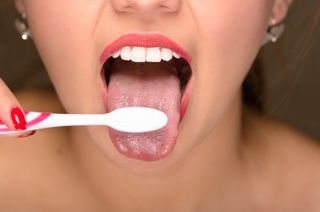Why Does OJ Taste Bad After You Brush Your Teeth?

There's nothing like a fresh, tangy glass of orange juice to go with your morning oatmeal. But if you've just brushed your teeth, you may find that the beverage tastes … less than delicious.
So, why does toothpaste affect the taste of orange juice and other sweet breakfast (or midnight) snacks? It all boils down to what's happening with the taste receptors on our taste buds, Guy Crosby, a nutrition professor at the Harvard T.H. Chan School of Public Health, told Live Science.
In a nutshell, a compound in toothpaste called sodium lauryl sulfate (SLS) alters the way we process certain tastes, at least temporarily. [Why Do Some People Hate the Taste of Beer?]
But let's start with how we detect different tastes. If you touch your tongue, you'll notice that it's covered with bumps and mini-ridges. Each of these bumps is made up of taste buds, which in turn are made up of taste receptors. Our mouthshave between 2,000 and 4,000 taste buds in total, and each taste bud has between 10 and 50 receptors. In other words, humans are well-equipped to savor different foods.
All of our taste buds help us to perceive five types of flavors: sweet, salty, sour, bitter and umami. (That last term describes savory foods, like cured meats, mushrooms and fermented cheeses.)
The act of tasting is a bit like a chemical puzzle. When we chomp into something, that food releases molecules that have certain shapes, and these shapes float around in our mouths. Each flavor of food has a unique shape, which matches up to a type of taste receptor with a corresponding shape. For instance, when the bitter molecules from our lunchtime arugula salad bind to a bitter receptor, that sends a series of neural signals to our brain announcing that we've tasted something bitter.
However, a compound present in most toothpastes wreaks havoc on this tango between flavor molecules and taste receptors.
Sign up for the Live Science daily newsletter now
Get the world’s most fascinating discoveries delivered straight to your inbox.
During a vigorous toothbrushing, toothpaste bubbles and froths in your mouth. This happens because the paste includes that aforementioned compound, SLS, which acts as a detergent on your teeth. SLS is found in products that bubble or foam, including personal care products such as shaving cream and household cleaners like dish soap. But research has shown that SLS affects the ability of our taste receptors; it makes them more susceptible to bitter tastes and dials back how much we can taste sweet flavors.
Oranges are slightly bitter, thanks to citric acid, but that taste is typically obscured in juice by the extra sugar that companies mix into the drink. According to the American Chemical Society, SLS not only suppresses our sweetness receptors, but also wipes out our phospholipids — compounds that hinder our bitterness receptors. In effect, our taste buds suddenly taste a lot more of OJ's bitter taste than its sugary-sweet goodness.
All research on the topic of SLS and its impact on taste traces back to a 1980 study in the journal Chemical Senses, Crosby said. According to Crosby, the paper's authors state that SLS reduces the sweetness of sucrose (essentially sugar), the saltiness of sodium chloride (salt) and the bitterness of quinine (the flavoring used in tonic water) but increases the bitterness of citric acid (typically found in fruits like limes and oranges). [Do Mouthwashes Work?]
However, there is no specific mention in the paper of toothpaste's effect on the taste of orange juice, Crosby said. Even so, "I believe it is best to describe the effect of toothpaste on the taste of orange juice as a theory, but one that makes good sense based on the research reported,"Crosby said.
But juice lovers, don't despair. These taste effects dissipate "on the order of minutes," according to the 1980 paper.
Crosby said that waiting just a few minutes is all that's needed, as the physical interaction between SLS and taste cells is a temporary change. The SLS dissolves away with additional saliva, and once we eat other foods, normal taste sense is restored, he said.
Simply put, next time you want OJ for breakfast, you might consider brushing your teeth, showering and then dashing off to the refrigerator for your morning juice. Or, you can just brush your teeth after you gulp down your juice.
Original article on Live Science.
Aylin Woodward is a science reporter who covers space exploration, anthropology, paleontology, physics and material sciences. She has written for Business Insider and now reports at The Wall Street Journal. She graduated from the University of California, Santa Cruz science communication Master's program, and earned a bachelor's degree from Dartmouth College. She received a National Science Foundation Graduate Research Fellowship in 2016 for work focused on hominin bipedalism.
Most Popular


